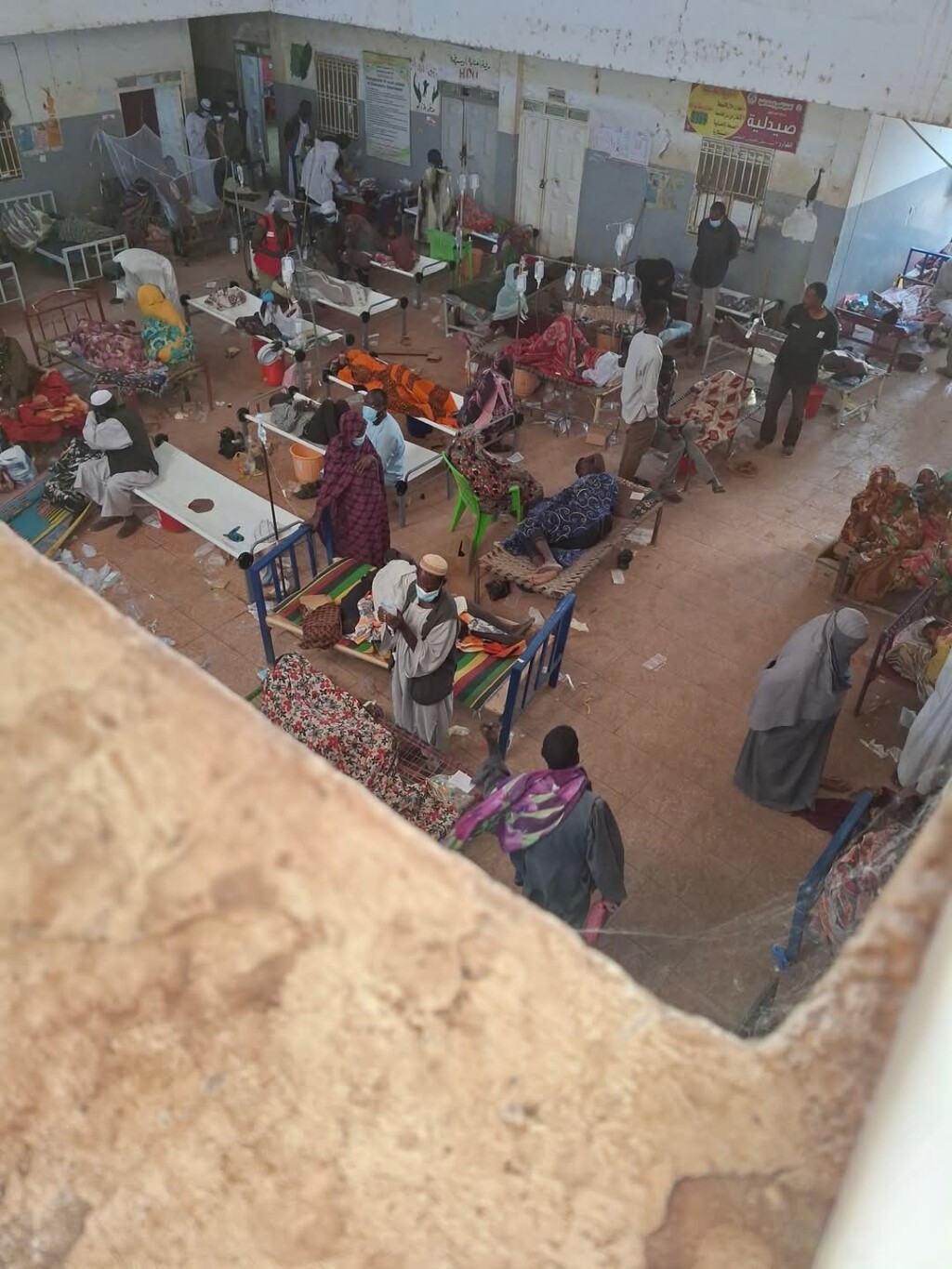Sudan’s White Nile state hit by cholera epidemic, 108 die in four days

Kosti Teaching Hospital, February 22 (Photo: Journalist Rashid Oshi via his Facebook page)
The death toll from the rapidly spreading cholera epidemic in Kosti, White Nile state, rose to 108 on Friday. The federal Ministry of Health reported on Saturday that more than 1,300 cases were recorded the town within three days. “The situation is really alarming,” Dr Francis Layoo Ocan, medical referent of Médecins Sans Frontières (MSF) in Kosti, said last week. Yet, a vaccination campaign and measures taken by the local authorities seem to help to bring down the number of patients.
Sources in Kosti reported on Saturday that volunteers buried 50 bodies of cholera patients who died in the town, while the Ministry of Health announced the death of 58 others inside the Kosti Teaching Hospital.
The 108 bodies were buried in the Wad Um Jambo cemetery. No numbers have been given concerning the other cemeteries.
The White Nile Emergency Room reported on Saturday that more than 90 cholera cases had been admitted to the teaching hospital of Rabak, the capital of White Nile state, of which eight died.
‘Sudden outbreak’
The federal Ministry of Health in Port Sudan announced on Saturday that 1,351 cholera cases were recorded in Kosti within three days last week.
MSF reported in a press release on Friday that more than 800 patients were “being treated for symptoms of acute watery diarrhoea, dehydration, vomiting, and sunken eyes at the Ministry of Health cholera treatment centre in Kosti Teaching Hospital”, which is supported by the international medical organisation in White Nile state.
The organisation has been supporting cholera-related responses in Kosti and in Rabak since October 2024.
“Recently, the number of cases had decreased, with some days seeing fewer than 20 patients,” the press release says. “However, that suddenly changed on Wednesday night when the first 100 patients arrived at the cholera treatment centre.
“By Friday afternoon, there were over 800 admitted patients. At least two dozen people died at the centre and at least one person was dead on arrival. So far, 48 patients have been discharged. The numbers continue to rise and keeping a detailed tally has become difficult for the team responding.”
“The situation is really alarming and is about to get out of control,” said Dr Francis Layoo Ocan, MSF’s project medical referent in Kosti. “The cholera treatment centre keeps receiving patients in critical condition. We’ve run out of space, and we are now admitting patients in an open area and treating them on the floor because there are not enough beds.”
Contaminated water
The most likely source of infection is the White Nile River, where many families have been collecting water using donkey carts after a major power outage in the area, MSF stated.
The federal Ministry of Health confirmed that contaminated drinking water is the main cause of the epidemic and pointed to the shutdown of the main water station in Kosti after the paramilitary Rapid Support Forces (RSF) targeted the Um Dabaker power station.
The ministry announced on Sunday that the White Nile state authorities have managed to re-open the main water station in Kosti. The Ministry of Health sent 40,000 units of intravenous solutions to the hospital.
The bed capacity of the hospital’s isolation centre was increased with the support of the World Health Organisation, UNICEF, MSF, and Plan Sudan, and several Sudanese organisations.
The Sudanese health ministry further stated that “the White Nile state government activated the Public Health Emergency Law and closed markets, shops, and schools on Friday and Saturday, began implementing environmental sanitation campaigns, and applied general health precautions and requirements”.
The management of the Kosti Central Market Unit, the main source of all vegetables and fruits that come to the town, closed the market this morning. It will stay closed until Thursday, as a precautionary measure to combat the cholera epidemic.
The Ministry of Health also launched a vaccination campaign to respond to the cholera epidemic. Implemented by the White Nile health promotion department, the campaign continued on Sunday for the third day.
‘Noticeable decrease’
The measures seem to help, as the White Nile Emergency Room yesterday announced a noticeable decrease in admissions and deaths at the Kosti Teaching Hospital. 225 cases were admitted to the isolation centre. Fourteen of them died. About 1,000 patients recovered.
Volunteers continue to provide assistance, including providing meals and drinks to the medical staff of Kosti hospital, and intravenous solutions and medicines to the patients.
Displaced
The war that erupted between the Sudanese army and the RSF in mid-April 2023, has led to an extremely large humanitarian crisis. It has placed Sudan among the top four countries globally for the highest prevalence of global acute malnutrition. More than 24 million people, nearly half of the population, are in dire need of food aid.
Moreover, Sudan is battling multiple disease outbreaks, including cholera, malaria, dengue fever, measles, and rubella. Medics have warned of the spread of highly contagious epidemics with every wave of displacement, to the point where it would be difficult to control the epidemic. The health authorities are not prepared to receive these large numbers of displaced persons and do not have a plan to combat epidemics and limit their spread, a medic told Radio Dabanga in November last year.
According to the United Nations Office for the Coordination of Humanitarian Affairs (OCHA) in early October last year, more than 17,600 cholera cases and 546 associated deaths were reported in Sudan since the large cholera epidemic that broke out in eastern and northern Sudan in July. In September and October, UNICEF provided more than 1.4 million doses of oral cholera vaccines to Sudan. They would be used to vaccinate 1.81 million people in the then hardest-hit states: El Gedaref, Kassala and River Nile state, states that host large numbers of displaced from Khartoum and El Gezira.











 and then
and then